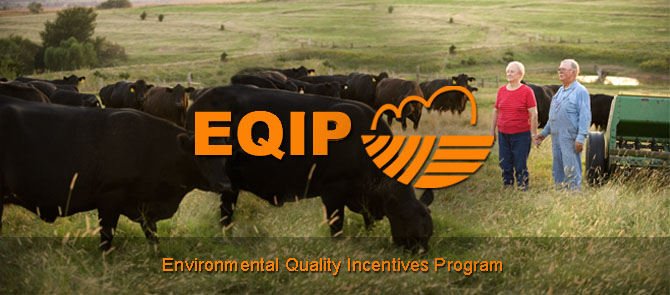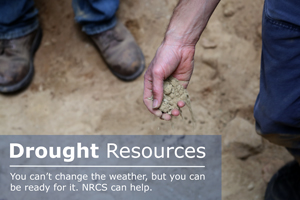Maine 2017 State Environmental Quality Incentives Program Signup and Application

Note: With the enactment of the Agricultural Act (February 7, 2014) funding provided for the Wildlife Habitat Incentive Program (WHIP) in FY-2015 is no longer available for obligations. WHIP is not reauthorized. Portions of the WHIP Statute were rolled into the Environmental Quality Incentives Program (EQIP).
NRCS will honor and continue to support prior fiscal year WHIP program contracts using the rules and policy that were in effect at the time of contract obligations.
General EQIP Program Description
The Environmental Quality Incentives Program (EQIP) provides financial and technical assistance to agricultural producers in order to address natural resource concerns and deliver environmental benefits such as improved water and air quality, conserved ground and surface water, reduced soil erosion and sedimentation or improved or created wildlife habitat.
Agricultural producers and owners of non-industrial private forestland and Tribes are eligible to apply for EQIP. Eligible land includes cropland, rangeland, pastureland, non-industrial private forestland and other farm or ranch lands. Socially disadvantaged, beginning and limited resource farmers, Indian tribes and beginning farmers/veterans are eligible for an increased payment rate and may receive advance payment of up to 50 percent to purchase materials and services needed to implement conservation practices included in their EQIP contract.
The Environmental Quality Incentives Program is a voluntary conservation program from the Natural Resources Conservation Service. It supports production agriculture and environmental quality as compatible goals. Through the Environmental Quality Incentives Program, agricultural producers may receive financial and technical help with structural and management conservation practices on agricultural land.
The Environmental Quality Incentives Program provides financial assistance in the form of a fixed payment rate for each eligible practice and activity under contract. The payment rate will be the compensation for the program participant.
Applications for the EQIP program are accepted on a continuous basis, however, NRCS establishes application “cut-off” dates for evaluation and ranking of eligible applications. The deadline for Fiscal Year 2016 EQIP applications has passed. The deadline for applications for Fiscal Year 2017 EQIP funding was Aug. 19, 2016. Applicants will be asked to work with NRCS conservation planners to assess resource needs and agree on practices to treat these needs.
2017 Environmental Quality Incentives Program General Program Documents
Statewide Application Evaluation and Ranking Tools
Aquatic Organism Passage
Maine NRCS has funding available for an Aquatic Organism Passage Initiative. Projects through this Initiative will re-connect highly-fragmented stream habitat by removing barriers to aquatic organism passage, with an emphasis on decreasing threats to and eventual recovery of the federal endangered Atlantic salmon and enhancing critical fish habitat. Projects will also enhance in-stream habitat using the practice Stream Habitat Improvement and Management to increase habitat heterogeneity which will increase fish carrying capacity and increase stream resiliency to human disturbance and climate change.
Applications are accepted on a continuous basis. However, the deadline for the Aquatic Organism Passage Initiative for 2017 funding consideration was August 19, 2016.
Drought Mitigation Strategy
 Widespread drought conditions during the 2016 growing season have affected farms across Maine and New England, resulting in the USDA designating Androscoggin, Kennebec, Lincoln, Oxford, and Sagadahoc Counties as primary natural disaster areas because of the dry summer. Farmers and ranchers in Cumberland, Franklin, Knox, Somerset, Waldo and York Counties also qualify for natural disaster assistance because their counties are contiguous.
Widespread drought conditions during the 2016 growing season have affected farms across Maine and New England, resulting in the USDA designating Androscoggin, Kennebec, Lincoln, Oxford, and Sagadahoc Counties as primary natural disaster areas because of the dry summer. Farmers and ranchers in Cumberland, Franklin, Knox, Somerset, Waldo and York Counties also qualify for natural disaster assistance because their counties are contiguous.
NRCS-Maine established a $500,000 statewide pool using Environmental Quality Incentives Program (EQIP) funds to help farmers address the concerns of water availability and water holding capacity/infiltration.
The sign-up period for the funding is open now, and closes March 17, 2017.
2017 EQIP Statewide Fund Pool - Drought Mitigation Strategy (.pdf)
Drought Resources site
Conservation Activity Plans
Maine NRCS has opportunities through the Environmental Quality Incentives Program to help develop Conservation Activity Plans (CAPs). A CAP is a specialized conservation plan prepared specifically for a conservation management unit. CAPs are developed by a Technical Service Provider, who is certified by NRCS and placed on an approved list to provide technical assistance to farmers and others for specific conservation programs administered by USDA. Applications are accepted on a continuous basis for all plans. Applications are accepted on a continuous basis; however, the deadline for EQIP Conservation Activity Plan for 2017 funding consideration was August 19, 2016.
Irrigation Assistance Available Through EQIP
Under the 2008 Farm Bill, priority will be given to water conservation or irrigation efficiency applications that will reduce water sue or where the producer agrees not to use any associated water savings to bring new land under irrigation production.
Maine NRCS will set aside at least $1,000,000 each year in financial assistance funding for eligible applicants across the state. These dollars will be used to fund projects that address irrigation efficiency and assist producers to comply with Maine Department of Environmental Protection Chapter 587 In-Stream Flows and Lake and Pond Water Levels regulations.
The signup for irrigation assistance is continuous. However, the deadline for Fiscal Year 2017 applications was August 19, 2016.
On-Farm Energy Initiative
The EQIP On-Farm Energy Initiative enables the producer to identify ways to conserve energy on the farm through an Agricultural Energy Management Plan (AgEMP), also known as an on-farm energy audit; and by providing financial and technical assistance to help the producer implement various measures and practices recommended in an on-farm energy audit.
Applications are accepted on a continuous basis; however, the deadline for the On-Farm Energy Initiative for 2017 funding consideration was August 19, 2016.
Organic Agriculture Initiative
Maine has received funds for an organic initiative to encourage more organic agriculture production. Funding for the initiative is being made available through EQIP. Successful applicants will receive funding to implement conservation practices that have been identified as needed to improve natural resource conditions. Not only do these practices offer significant environmental benefits, but they are also important to growers.
Applications are accepted on a continuous basis; however, the deadline for the Organic Initiative for 2017 funding consideration was August 19, 2016.
Additional conservation practices eligible to be contracted under the Organic Agriculture Initiative in Maine are listed in the Organic Initiative Payment Schedule. A link to this payment schedule is provided below. To access the NRCS Standard and Specification information for these practices, please go to Section IV of the Maine NRCS Electronic Field Office Technical Guide (eFOTG).
If producers who sell less than $5,000 a year wish to use EQIP to implement practices related to organic production, they may do so; however, they are required to implement conservation practices for certified organic production that are consistent with an Organic System Plan (OSP). Payments are not authorized for activities or practice components which are solely production related and are not linked to an identified resource concern. Payments may not be used for any costs related to organic certification.
High Tunnel Systems
For more information on High Tunnel Systems, contact your local USDA Service Center.
High Tunnel System overview (pdf)
High Tunnel System specifications (pdf)
National Water Quality Initiative
The National Water Quality Initiative will work in priority watersheds to help farmers, ranchers and forest landowners improve water quality and aquatic habitats in impaired streams. NRCS will help eligible producers implement conservation and management practices through a systems approach to control and trap nutrient and manure runoff. Qualified producers will receive assistance for installing conservation practices such as cover crops, filter strips and terraces.
In Maine, two watersheds were selected to participate in this initiative: The Meduxnekeag River Watershed in southern Aroostook County and Twenty-Five Mile Stream Watershed in Waldo County. Within each of these Watersheds, several sub-watersheds were identified as priority areas as listed below and shown in the overview maps.
2017 National Water Quality Initiative Overview Maps
-
Meduxnekeag Watershed: Nickerson Lake-Meduxnekeag sub-watershed and Smith Brook-Meduxnekeag River sub-watershed. For more information about applying in this watershed, contact:
Houlton Field Office
304 North Street
Houlton, ME 04730-9527
(207)532-2087 x3
-
Twenty-five Mile Stream Watershed: Unity Pond, Halfmoon Stream and Sandy Stream sub-watersheds. For more information about applying in this watershed, contact:
Belfast Field Office
46 Little River Drive
Belfast, ME 04915
(207)338-1964 x3
The deadline for the National Water Quality Initiative for 2017 funding consideration is Feb. 17, 2017.
2016 National Water Quality Initiative Application Evaluation and Ranking Tools (AERT)
Working Lands for Wildlife
NRCS in partnership with the Department of the Interior’s Fish and Wildlife Service is providing an opportunity which allows farmers and forest landowners to use innovative approaches to restore and protect habitat for at-risk wildlife species such as the New England cottontail rabbit. Working Lands for Wildlife is a national effort that will demonstrate that productive working rural lands are compatible with the needs of sensitive wildlife species. The NRCS provides financial assistance through EQIP Working Lands for Wildlife related contracts for this initiative.The agencies have strategically identified seven at-risk species nationwide that would benefit from conservation investments made by landowners on private lands. One of those species is the New England cottontail rabbit; New England cottontail habitat is targeted in Connecticut, Maine, Massachusetts, New Hampshire, New York and Rhode Island. The initiative is a voluntary, incentive-based effort that has three primary objectives: (1) Restore populations of the New England cottontail rabbit; (2) provide farmers, landowners and forest managers with regulatory certainty; and (3) strengthen rural economies through productive working lands.
The New England cottontail rabbit is listed as a priority species, and it is listed as an “endangered” species by state law in Maine. It is currently listed as a candidate species under the Federal Endangered Species Act due to an 86 percent decline in its historic range. The primary threat to the New England cottontail rabbit is loss of habitat through ecological succession, i.e. the gradual process by which ecosystems change and develop over time. As forests mature, the understory plant communities thins to such an extent that the habitat is no longer suitable for New England cottontail rabbits.
New England cottontail rabbits often live in landscapes suitable for agriculture and forestry and averting the need for formal federal listing of the species will help landowners by maintaining management flexibility. Working Lands for Wildlife will assist private landowners to create and enhance shrub thicket and early successional forest, supporting New England cottontail rabbit recovery.
Other Information
Maine Electronic Field Office Technical Guide
For more information contact your local USDA Service Center.
Statewide Program Contact: Susan Arrants, Assistant State Conservationist for Programs, (207) 990-9564 or email susan.arrants@me.usda.gov
12/23/16
����